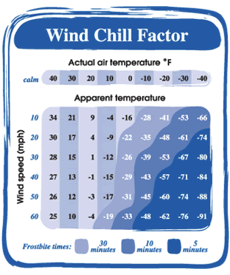
Both in the community and in acute and long-term care institutions, nurses need to be particularly vigilant in protecting frail elderly patients from hypothermia. It is important to remember that the ambient room temperature and amount of clothing that a younger caregiver finds comfortable may not be sufficient for a frail elderly person. Nurses are in a key position to teach unlicensed assistive personnel and family members or other caregivers effective strategies to decrease heat loss in elders at high risk for hypothermia.
Nursing interventions that can prevent accidental hypothermia in elderly adults include:
Many elders who would have
been institutionalized in the past are now remaining in the community where
they receive nursing services. Nurses working in the community should assess
the available warmth and sources of heat in the home. It is important to demonstrate
to the patient and family/caregivers how to prevent heat loss, and to provide
information about energy assistance programs available for elderly people with
limited incomes.
The exposed elderly are at particularly high risk of hypothermia and tissue damage due to heat loss. Please note that the Windchill Chart presents approximate frostbite exposure times for normal healthy individuals. Every effort must be made to protect the eldery from even short exposure to convective heat loss.

The National Institute on Aging Cold Weather Safety that shows how to avoid hypothermia. This information can be obtained by calling 1-800-222-2225. The National Energy Assistance Referral Program (NEAR) can help seniors pay their heating bills. Be calling 1-800-674-6327, NEAR operators will give individuals the number of their state Low Income Home Energy Assistance Program office and local agency referrals for help paying energy bills.
Instant feedback
A
warm (not hot) air hair dryer should be used to dry the hair of persons prone to hypothermia,
allowing the hair to air dry can increase evaporative heat loss.
©RnCeus.com